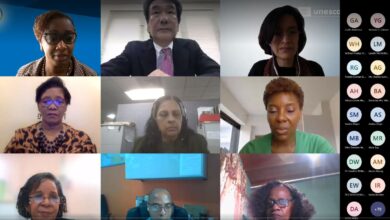The Government of Japan is supporting member states of the Caribbean Community (CARICOM) with harmonizing national teaching standards with those articulated in the CARICOM Standards for Teachers, Educational Leaders, and Teacher Educators.
Over 150 stakeholders participated in three one-day orientations workshops for the Development of National Standards for the Teaching Profession from July 19-23.
Discussions centered on the strengthening and harmonising of standards throughout the education eco-system and improving learning outcomes for the Region’s students.
Speaking at the opening of the first workshop, Director in the Directorate of Human and Social Development, Mrs Helen Royer said,
“This is an opportunity for Member States to move from articulating aspirations for quality teaching to towards concrete actions designed to unleash the potential of CARICOM Teachers, the schools and communities they serve, the students they nurture and the economic drive of the region.”
She said the workshop was useful to highlight good education practices embedded in Member States while providing a pathway for how to address the challenges others have in designing and implementing their own national standards.
Mrs Royer explained that while emphasis is on developing national standards for teachers’ delivery in the classroom, and for effectiveness in educational leadership, the Member States should also conceive plans to support teacher education understanding that teacher preparation and professional development are critical.
Mrs Royer expressed appreciation for the support from Japan-CARICOM Friendship Cooperation Fund, which is making a consultant available to assist Member States in developing and reviewing their national standards, and in designing national implementation plans.
Speaking on behalf of the Plenipotentiary Representative of Japan to CARICOM, H.E. Mr. Tatsuo Hirayama, the First Secretary of the Embassy of Japan in Trinidad and Tobago, Mr. Nobuaki Hanawa said the Japan-CARICOM Friendship Cooperation Fund served several areas since its operationalization in 2001.
Noting that CARICOM will always have a friend in Japan, he said the Cooperation Fund has buttressed development in agriculture, tourism promotion, waste management, export promotion, support to small and medium enterprises, education and the Region’s response to the COVID-19 pandemic through testing and vaccination.
Dr. Barbara Reynolds, the project’s consultant, facilitated the workshops. At the opening session, she illustrated the linkages between quality education and national development. Stating that this is evident in most developed countries, where more than 40% of the population are college graduates.
She opined that while, the Region has a solid education system, several studies show that “some of our curricula and pedagogy are still lagging behind 21-century skills and competencies, the starting point for the Human Resource Development 2030 Strategy.”
Dr Reynolds called attention to the need to build out the regional educational quality eco-system to ensure that ultimately teaching-learning activities respond to students whether in face-t0-face, blended or virtual settings.
Dr. Marcia Stewart, Chair of the Technical Working Group for Teaching Standards oriented the participants on the CARICOM Standards for the Teaching Profession: Teachers, Educational Leaders and Teacher Educators.
During her presentation, she told the participants, that being stirred into the profession of teaching is developmental and occurs within communities of practices. As such, she added, “no individual is fully developed as a teacher upon graduation from teacher training and the potential for growth should be aligned with career development.
At the end of the first workshop, Dr Laurette Bristol, Programme Manager within the CARICOM Secretariat’s Human Resource Department sub-programme, underlined the opportunity it created to discuss where Member States were with establishing teaching standards within the education ecosystem.
She noted that the CARICOM Secretariat would be following-up with their progress and hastened to add that the principles around standards for the teaching profession are not meant to be punitive; rather, they support the well-being of teachers while articulating the conditions needed to improve student learning outcomes.


